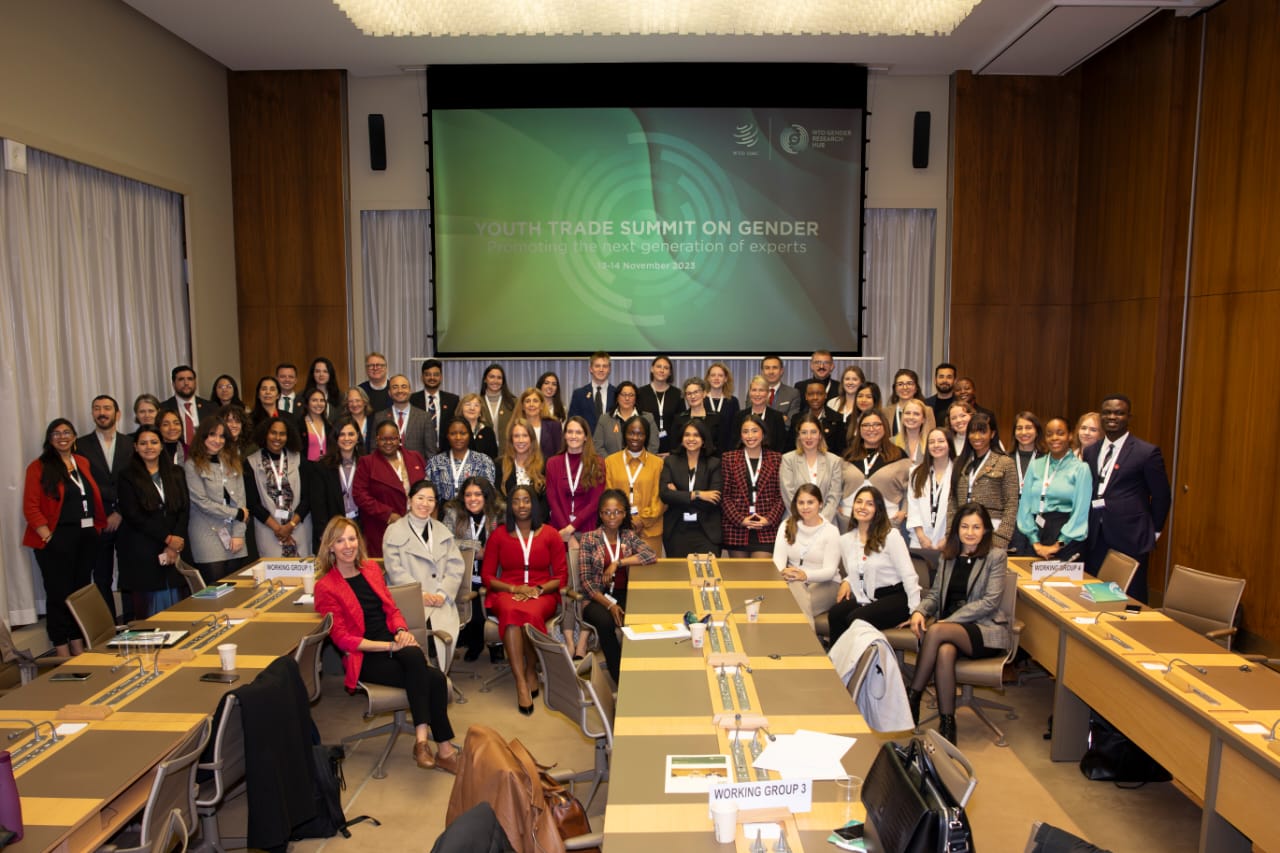Dispatch from the WTO's inaugural Youth Summit
Madison Paisley '23 is working towards a Master's of Global Governance at the Balsillie School of International Affairs. Her research interests include intellectual property rights and their intersection with decolonization and traditional and Indigenous knowledge, trade and development, social justice, and international/multilateral organizations. In November 2023, she was among 65 delegates selected to attend the World Trade Organizations' Youth Summit on Trade and Gender. Read about her experience in her first blog post from the field.
Dispatch from the World Trade Organizations’ Youth Summit on Trade and Gender in Geneva:
Madison Paisley’s First Blog from the Field

Delegates at the Youth Summit on Trade and Gender.
Photo by World Trade Organization.
I was one of fifty-six delegates selected from across the world to attend the WTO’s inaugural Youth Summit on Trade and Gender. A diverse mix of representatives from government, international organizations, and academia gathered with experts on trade and gender to discuss current issues and possible solutions pertaining to the gendered impacts of trade policy.
During the two-day summit, I participated in technical conferences on several topics related to trade and how gendered impacts were being accounted for, and the challenges that still exist with trying to quantify these impacts. We discussed challenges women face in obtaining trade finance, gender disaggregation in research, gender and e-commerce, and several other topics. We also listened to talks from permanent country representatives at the WTO who sit on the informal working group on trade and gender and representatives of countries that have adopted feminist foreign policy programs.
I spent the second day participating in different working groups. We were given a case study of a fictional country and were tasked with analyzing the country’s success in affirming women’s economic empowerment (WEE) and integrating gender issues into its policies and programmes. The country had no name but was a collection of statistics from countries within the South American and African regions. We also needed to determine a few key issues and prescribe ways that trade could help address them; our group pinpointed the low levels of education and literacy for women and the lack of women in leadership positions as a few of the most important issues to address. Finally, as a group, we needed to agree to future commitments to do trade better so that existing regimes do not exacerbate gender imbalances and propose one recommendation to the WTO. The caveat was that, in traditional WTO style, all participants needed to come to a consensus on all of our recommendations and pledges.
The country, though fictional, represented an amalgamation of very real issues faced by many states. Working through the process of analyzing the country's issues, our group needed to prescribe ways in which trade policy can positively influence gender-related issues. This was a really good challenge in synthesizing theoretical and practical knowledge, and it also challenged us to think outside of our respective roles. For example, some of my group members had a law background, which is very different from that of my own liberal arts background. I found that my ability to work with nuance and consider ‘grey areas’ was beneficial to my group’s analysis because I was able to see the connections between the areas selected for analysis in the case study.
At the end, my group pledged that we would “facilitate and/or conduct impact assessments, within the context of each of our roles, of the gender-related commitments taken by our respective entities (academic institutions, our own research, domestic governments, and international organizations). We also put forward a recommendation to the WTO that the Secretariat build a platform for “information sharing, containing policies, financing options, technical assistance, capacity building, research, and programs supporting communities that face gender-based barriers in international trade” to which, representatives from the WTO trade and gender office said that they would be interested in bringing forward in further meetings.
Though I found this experience to be greatly beneficial for my own knowledge of trade policy and processes, it also reinforced just how much work is yet to be done in promoting equal and inclusive trade. I plan to follow my pledge and consider gender in all of my work, even to a greater extent than currently. I hope to be able to follow up with my fellow delegates and WTO representatives about progress down the line.
